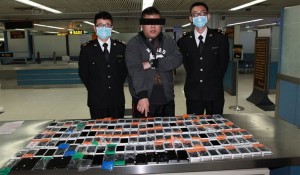On March 13th a man was discovered smuggling 146 IPhones from Hong Kong into mainland China. In financial terms, he was carrying anywhere from US$76,000 to US$181,000 in product (depending on which models and options he had).
Chan Shih, 30, was spotted walking “at a really slow pace with a strangely stiffened back”  while carrying only a small shoulder bag March 6 Shenzhen City, Guangdong Province. Officers had the man walk through a metal detector, and he was taken for a search when the device indicated the presence of metallic objects on his body. The man was found to have 126 iPhones strapped around his waist in a belt-like formation and another 20 devices were found strapped to his legs. As border officers said, smugglers usually attempt to sell IPhones they bought in Hong Kong, without paying any sales taxes, at a profit in the mainland.
while carrying only a small shoulder bag March 6 Shenzhen City, Guangdong Province. Officers had the man walk through a metal detector, and he was taken for a search when the device indicated the presence of metallic objects on his body. The man was found to have 126 iPhones strapped around his waist in a belt-like formation and another 20 devices were found strapped to his legs. As border officers said, smugglers usually attempt to sell IPhones they bought in Hong Kong, without paying any sales taxes, at a profit in the mainland.
Although most IPhones in China are sold legally, the black market for IPhones is a very lively one. According to sales data from Kantar Worldpanel ComTech a quarter of all smartphones sold in China are IPhones, however, a majority of cellphone users in China have yet to make the transition from feature phones to smartphones. This is where smugglers come in, allowing consumers to buy IPhones at a discounted price and making Apple the largest player in the Chinese smartphone market.
Source 1: http://www.malaysiandigest.com/technology/545769-this-is-how-your-gray-market-iphones-get-into-china.html
Source 2: http://www.dailymail.co.uk/news/peoplesdaily/article-2993444/Smuggler-caught-astonishing-146-iPhones-taped-body-trying-convince-customs-officers-gold-BRACELET-set-metal-detectors.html
Source 3: http://www.cultofmac.com/314096/quarter-smartphones-sold-china-iphones/
In a semi-authoritarian system, do goods like this get smuggled in frequently? From this post, it seems that foreign electronics are very popular and the black market is active for them, but how extensive is the Chinese black market in general?
It seems difficult to gauge black markets in an economy that discriminately regulates against some competitors and blurs the line between public and private enterprises.
We’ll get some sense of the magnitude of smuggling in the US as more states make marijuana less illegal….what happens in Mexico and other, er, points of departure? But there’s a long history of smuggling in the US, particularly during prohibition. China may have an easier time because most border crossings are fairly well controlled. Not too many people are going to try to smuggle iPhones across the border with Myanmar…
In the back however is that accession to the WTO resulted in the removal of many trade barriers. Smuggling just isn’t the entrepreneurial attraction it was in China in the 1980s.
I wonder the reasons for higher ASPs in China? Are there higher selling costs? Exchange rate risks? Or, is it because Apple can just get away with it?